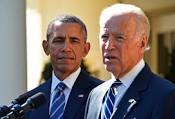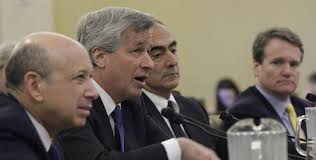NOTE: This article was originally published in December 2019, but it is more pertinent today. The reason: Biden is continuing his naive belief that the Republicans will work with him, even as the vast majority of Republican senators do not even acknowledge that he won the election. This is the same naivete that drove Barack Obama, even as Republicans ignored and ridiculed him, to believe he could work with the new Tea Party-Right Wing Republicans. These same forces are more entrenched and more powerful today than when Obama was in office. Biden will be making a big mistake if he thinks his older form of bipartisanship has a receptive Republican audience in 2020.
As a former vice president and with a 46-year-long career in politics, Joe Biden is no stranger to Washington. As Barack Obama’s vice president (2009-2017), he traveled the world, served as Senator from Delaware from 1973 to 2009, and unsuccessfully sought the Democratic nomination for president in both 1988 and 2008.
He also is a firm believer in a traditional form of governance that may be outmoded, either permanently or temporarily, due to Trump’s election, the rise of the right-wing extremism, and its fundamental change to the Republican Party.
As the New York Times says, Biden “firmly believes in the value of bipartisanship and insists on extending overtures to Republicans even in a moment when many in his own party don’t see negotiating partners on the other side.”
So, for voters in the 2020 election, one large, looming question is whether Biden’s view and reliance on bipartisan legislative action is a realistic way to govern?
Voters should also ask if Biden’s bipartisan approach is nostalgia or is he ignoring the fundamental change Trump’s scorched-earth political process will do to Biden’s optimistic or naïve approach to making deals with the Republicans? 
If so, do other Democratic candidates have a better grasp of the future when governing in a post-Trump Republican environment? Would they be better suited as candidates to confront a right-wing Republican Party that has no desire for bipartisanship?
In November 2020, Biden’s former friend, Sen. Lindsey Graham was involved in controversy after calling election officials in Nevada, Arizona, and Georgia — three key states won by Biden — to badger them on procedures for mail-in ballots, which generally favored Biden. So with friends like this, who needs enemies?
The Role of the Extreme New Right
As early as the 1970s, Republic establishment politics was viewed as antiquated by more far-right believers who believed the Republican Party was just a social club for the wealthy. What was needed, its leaders said, was a “passing of parties” from the traditional role of political parties as conciliators who would put “brakes on the whims of the masses,” according to Daniel Schlozman and Sam Rosenfeld in their 2019 paper, “The Long New Right and the World It Made,” the goal of the New Right was “to smash liberalism” in all its forms, including social and economic programs.
To do this the New Right would break all political and social rules. They would then use “over-the-top appeals for money, phony controversies, fixations on trivialities, larger-than-life media personalities, and lurid scandals,” the authors said. “The commitment to conflict and the ruthless instrumentalism toward institutions have combined to produce a politics devoid of either internal checks on extremism or, in contrast to traditional understandings of conservatism, a sense of limits, whether tactical or substantive.” Everything was acceptable, including the use of open conflict, political and physical, to mentally unnerve US citizens.
This would be done by placing “conservatives in the television networks, in the universities, in corporations and companies and, perhaps most important of all, in the Federal Government,” according to a 1962 position paper.  Following this blueprint, Newt Gingrich and Pat Buchanan, who exploited the political power of resentment and open conflict to build their new political base, now had inspired other conservatives to derail the Obama presidency.
Following this blueprint, Newt Gingrich and Pat Buchanan, who exploited the political power of resentment and open conflict to build their new political base, now had inspired other conservatives to derail the Obama presidency.
Flash forward to Jan. 20, 2009, on the night Barack Obama was inaugurated. At a dinner meeting in a Washington steak house, conservatives Newt Gingrich, Jim DeMint, Jon Kyl, Tom Coburn, and conservative congressmen Eric Cantor, Kevin McCarthy, and Paul Ryan vowed to never compromise with any program the Democrats and Obama proposed or passed, as described in the PBS Frontline program “Inside Obama’s Presidency.”
Except for a brief period, Obama was made into a lame duck on the day of his inauguration as the “Republican Party of No” took control. The plan worked. To sell his economic bailout policies in 2009, Obama even left the White House to attend a meeting of the Republican caucus where he proposed his bank bailout package. Then, the Republicans surprised him. They rejected his entire proposal. Obama left the meeting dejected and publicly embarrassed. He tried to compromise, but it failed. When it came to the vote on the recovery package, not one Republican voted to support it.
The New Right Changes Biden’s Relationship with Lindsey Graham
Just before Obama’s inauguration in January 2009, Vice President-elect Joe Biden and Republican Senator Lindsey Graham took a bipartisan trip to Pakistan and Afghanistan. They told Pakistan’s president Hamid Karzai that his nation should root out terrorist support within the Pakistani intelligence services. Then, they had a troubling dinner with Karzai and his ministers, which quickly ended when the two pushed for Karzai to stop working with the Taliban, as described in the book, “Obama’s Wars” (2010) by Bob Woodward.
Yet by December 2019, Biden’s old view of bipartisanship and friendly debates was shattered when his former Republican colleague Graham, said Biden’s son Hunter should become a target of Trump’s impeachment investigation for his job as an advisor to a Ukrainian oil company. Biden was incensed. He said Graham had made a bad decision he would regret for the rest of his life.
Biden May Be Repeating Obama’s Mistakes
Obama campaigned as being a transformational president, one who was a member of a “different generation” of politicians. He also said the U.S. had suffered from “small-minded,” “24-hour, slash-and-burn” politics, which curtailed progress and hurt the country.
But once in office, Obama changed his position, especially when he had opportunities to make real, positive progressive change.
As described in the book “Confidence Men: Wall Street, Washington, and the Education of a President” (2011), Pulitzer Prize-winning author Ron Suskind told a remarkable story from March of 2009 meeting between Obama, his staff and the nation’s bankers. Suskind writes:
“Having ridden into office partly on a wave of popular anger at the economic power elite’s staggering malfeasance, Obama called a meeting of the nation’s top 13 financial executives at the White House. The banking titans came into the gathering full of dread, only to leave pleased to learn that the new president was in their camp. Instead of standing up for those who had been harmed most by the crisis—workers, minorities and the poor—Obama sided unequivocally with those who had caused the meltdown.
“My administration is the only thing between you and the pitchforks,” Obama said. “You guys have an acute public relations problem that’s turning into a political problem. And I want to help. … I’m not here to go after you. I’m protecting you … I’m going to shield you from congressional and public anger.”

“For the banking elite, who had destroyed untold millions of jobs, there was”, as Suskind put it, “nothing to worry about. Whereas [President Franklin Delano] Roosevelt had [during the Great Depression] pushed for tough, viciously opposed reforms of Wall Street and famously said, ‘I welcome their hate,’ Obama was saying, ‘How can I help?’”
“The sense of everyone after the meeting,” one leading banker told Suskind, “was a relief. The president had us at a moment of real vulnerability. At that point, he could have ordered us to do just about anything, and we would have rolled over. But he didn’t—he mostly wanted to help us out, to quell the mob.”
Obama’s great mistake was that he considered the banking crisis propelled by investment and housing fraud a “public relations problem.” As he had before with the rabid Tea Party Republicans who opposed him as early as 2010, Obama thought he could befriend those who hated him.
Similarly, when he tried to find a compromise on his Obamacare healthcare proposals, the Republicans pretended to listen, but it was a ruse. Behind the scenes, they were working on positioning Obamacare as a socialist plot that would force Americans to change doctors or cut their coverage. Bipartisanship again had collapsed.
Is Biden Naïve?
Today, as Congress moves ahead on Trump’s impeachment, think of Republican Representatives Jim Jordan. Kevin McCarthy, Louie Gohmert, Mitch McConnell, Steve King, and Barry Loudermilk, who said: “Pontius Pilate afforded more rights to Jesus than the Democrats have afforded this president.” All are rabid Trump supporters. None want any bipartisan compromise on major issues with Democrats.
So, as Biden boasts that he is the most experienced candidate to work with Republicans, he is pushing a nostalgic vision of the past that does not exist.
What is more concrete is that Biden is now working with former Obama fundraiser Louis Susman, a U.S. ambassador to the United Kingdom, due to his fundraising prowess. Sussman will now be working to raise corporate donations for Biden, who trails Bernie Sanders and Pete Buttigieg, on the fundraising front.
Some things don’t easily change, especially when it comes to fundraising. But what is more certain is that once New Right, Trump Republicans are out of power, they will fiercely resist any compromise with Biden, or any other Democrat, on transformational policy issues. This makes Biden’s vision of bipartisan nostalgia a thing of the past.











[…] Biden has repeatedly said he can work with Republicans. This is a tall order, but if it happens and Bernie gets the position, he can make a huge impact. […]